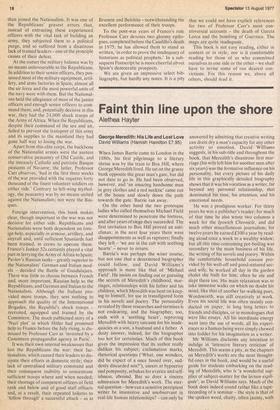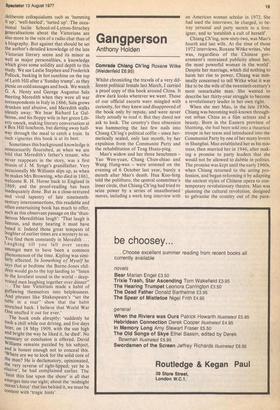Faint thin line upon the shore
Alethea Hayter
George Meredith: His Life and Lost Love David Williams (Hamish Hamilton £7.95) When James Barrie came to London in the 1880s, his first pilgrimage to a literary shrine was by the train to Box Hill, where George Meredith lived. He sat on the grassy bank opposite the great man's gate, but did not dare to go in. He had been observed, however, and 'an amazing handsome man in grey clothes and a red necktie' came out of the house and slowly down the path towards the gate. Barrie ran away.
On the other hand the two grotesque ladies who called themselves Michael Field were determined to penetrate the fortress, and after years of siege they succeeded. The first invitation to Box Hill proved an anticlimax; in the next four years there were disappointments as well as raptures; finally they left,— 'we are in the cab with seething hearts' — never to return.
Barrie's was perhaps the wiser course, but not one that a determined biographer could follow, and David Williams's approach is more like that of 'Michael Field'. He insists on finding out or guessing the secrets of Meredith's childhood, marriages, relationships with his father and his children, which Meredith was bent on keeping to himself, for use in transfigured form in his novels and poetry. The personality revealed by these researches and surmises is not endearing, and the biographer, too, ends with a 'seething heart', reproving Meredith with heavy sarcasm for his inadequacies as a son, a husband and a father. A dusty answer, indeed, for the biographer too hot for certainties. Much of this book gives the impression that its author really dislikes his subject; exclamation marks, rhetorical questions ('What, one wonders, did he expect of a once fussed over, sud'denly discarded son?'), sneers at hypocrisy and pomposity, rebukes for avarice and selfishness, abound. But so does a sincere admiration for Meredith's work. The eternal question — how can a sensitive percipient writer be insensitive and unobservant in real-life human relationships? —can only be
answered by admitting that creative writing can drain dry a man's capacity for any other activity or emotion. David Williams suggests, in his sub-title and throughout the book, that Meredith's disastrous first marriage (his wife left him for another man after six years) was the formative influence on his personality, but every picture of his daily life in this graphically detailed biography shows that it was his vocation as a writer, far beyond any personal relationship, that dominated his time, his attention, and his emotional needs. •
He was a prodigious worker. For thirty years he was a publisher's reader; for much of that time he also wrote two columns a week for the Ipswich Chronicle, and did much other miscellaneous journalism; for twelve,years he earned £300 a year by reading aloud once a week to a wealthy widow; but all this time-consuming pot-boiling was secondary to the main business of his life, the writing of his novels and poetry. Within the comfortable household cocoon provided by his well-off and good-natured second wife, he worked all day in the garden chalet she built for him; often he ate and slept there too. His main relaxation was to take immense walks on which no doubt his mind, like that of another far-walking poet, Wordsworth, was still creatively at work. Even his social life was often mainly conducted • on paper, in long long letters to friends and disciples, or in monologues that were like essays. All his inordinate energy went into the use of words, all his experiences as a human being were simply chewed into fodder for his imagination as a writer.
Mr Williams disclaims any intention to indulge in 'intensive literary criticism' of Meredith. This seems a pity, as the chapters on Meredith's works are the most thoughtful ones in the book, and would be a useful guide for students embarking on the reading of Meredith, who is 'a wonderful supplier of subject-matter for the lecture expliquee', as David Williams says. Much of the book does indeed sound rather like a taperecording of a seminar — the style is that of' the spoken word, chatty, often jaunty, with deliberate colloquialisms such as 'hamming it up', 'well-heeled', 'tailed up'. The occasional facile School-of-Lytton-Strachey generalisations about the Victorians are also more in the vein of a radio chat than of a biography. But against that should be set the author's detailed knowledge of the late Victorian literary scene and its minor as well as major personalities, a knowledge Which gives some solidity and depth to this study. We see Leslie Stephen and Frederick Pollock, basking in hot sunshine on the top of Leith Hill after a 'Sunday tramp', as they Picnic on cold sausages and hock. We watch G. A. Henty and George Augustus Sala meeting Meredith when they were all war correspondents in Italy in 1866; Sala grows drunken and abusive, and Meredith stalks Silently away. We hear Richard Le Galhenne, and his floppy wife in her green Liberty smock, making literary conversation at a Box Hill luncheon, but darting away halfway through the meal to catch a train. In such vignettes this book is at its best.
Sometimes this background knowledge is unnecessarily flourished, as when we are told that Meredith's father's tenant, who never reappears in the story, was a first cousin of J. M. Synge's grandfather. Very occasionally Mr Williams slips up, as when he makes Mrs Browning, who died in 1861, welcome R. H. Horne back to England in 1869; and the proof-reading has been inadequately done, But as a close-textured and vivid tapestry of late nineteenthcentury interconnections, this readable and Often entertaining book has much to offer, such as this observant passage on the 'thunderous Meredithian laugh': 'That laugh is famous, and many hearing it must have hated it. Indeed those great tempests of laughter of earlier times are a mystery to us. You find them constantly in Meredith . . . Laughing till you fell over seems amongst men to have been a common Phenomenon of the time. Kipling was similarly affected. In Something of Myself he says that at bedtime the Burne-Jones children would go.to the top landing to "listen to the loveliest sound in the world — deepvoiced men laughing together over dinner"
. The late Victorians made a habit of guffawing themselves into helplessness. And phrases like Shakespeare's "set the table in a roar" show that the habit stretched back. I believe that World War One snuffed it out for ever.'
The book ends abruptly: 'suddenly he took a chill while out driving, and five days later, on 18 May 1909, with the sun high and bright the way he liked it, he died'. No summary or conclusion is offered. David Williams remains puzzled by his subject, and is honest enough not to conceal this. Where are we to look for the solid core of the man? He is declamatory, opinionated, the very reverse of tight-lipped; yet he is elusive', he had complained earlier. The 'faint thin line upon the shore' is all that emerges into our sight; about the 'midnight Ocean's force' that lies behind it, we must be content with 'tragic hints'.



































 Previous page
Previous page